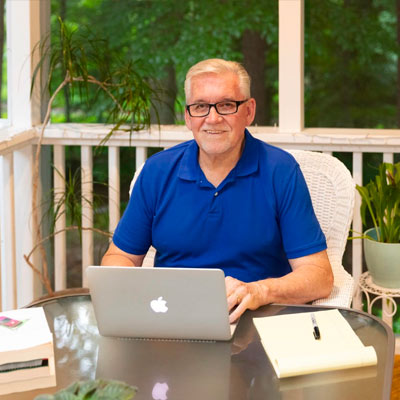There is a path to blindness, and then there’s a path through blindness. The sooner we can find resources like Hadley on our way to blindness, the better off we are going to be in getting through it.
Bill Massey retired from a career in marketing and advertising at the age of 60. Not ready to stop working, he embarked upon a second chapter as a sixth-grade art and art history teacher, which he describes as “the lowest paying but most rewarding job.” Having taught six class periods per school day with 35 students per class, and getting all new students every 18 weeks, Bill figures he taught about 5,000 kids during his 12 years in the classroom.
He retired from teaching in 2015, at the age of 72, because he could no longer travel to the school. His glaucoma had progressed to the point that he had to relinquish his car keys. Four years later, he could no longer read print.
Bill found Hadley through a presentation at the North Carolina Division of Services for the Blind, where he trained on the white cane and low vision skills.
It was a trip to the doctor’s office that prompted Bill to call Hadley. He recalls, “It was humbling to go to an office building and have to wait for someone to get in the elevator to push the button for me.” That was when he decided to learn braille.
Learning and Sharing Braille
Braille has many benefits for Bill, including allowing him to navigate public spaces to find the right floor, suite number or restroom. “It sounds like a little thing, and you don’t do it very often, but when you do, it is pretty important,” he says. He also likes the mental challenge and puzzle aspect of braille. He practices by writing to friends who use braille and brailles famous quotes to practice his punctuation.
Bill also continues his love for teaching by encouraging the kids in his neighborhood to learn about braille. He writes nursery rhymes in braille for them to translate. When they get it right, he rewards them with candy. If the kids find he has made a mistake, he gives them extra!
Becoming a Mentor
Hadley began piloting its mentoring program in 2022 and contacted Bill in hopes he would take part. He recalls, “my first thought was ‘I don’t know I am qualified. I am still struggling through this myself.’ Then, I realized the most important facet of a mentor is to say ‘this is where I’ve come from and what I’ve been through’ to people who have not yet traveled that road. You don’t have to be far down the road ahead of them before you can start sharing insights.”
Once matched with a mentee, “it only took a couple of conversations before I couldn’t tell if I was the mentor or mentee,” he remarks. Both benefitted by building this connection and sharing their experiences and resources. Since then, this network has continued to grow. Bill now has three mentees. He speaks with them individually a couple of times each month. One of his mentees has become a mentor, too.
“The best thing that has happened to me was being asked if I would be a Hadley mentor,” Bill declares. “It has given me a sense of confidence. If I hadn’t been part of it, I would not have thought I have this much to impart. There were things I didn’t feel comfortable getting involved in that I have no hesitance about anymore. Now, I know I can find my way.”
With this renewed confidence, Bill stays busy with many organizations and activities. He takes classes two days a week and volunteers with several outreach groups for people with visual impairment. Bill has also been named a Hadley HERO for his contributions to the Hadley community.
Hadley’s Impact
“Before I got involved with Hadley and things like braille and the mentorship program, I don’t think I felt like I had much of a future,” Bill states. A Vietnam veteran, he equates what he has learned through Hadley with aspects of his military service. “When I was in Vietnam, we had a relatively safe base camp zone we called ‘inside the wire.’ If we went outside the wire, we weren’t nearly as safe. Now, with my blindness, I feel more comfortable going outside the confines of my home and neighborhood, and into the expanse of my community as a whole. The hazards have been minimized.”
Looking back at the early days of vision loss, Bill feels a sense of frustration that medical professionals did not help him prepare for this transition. “There was a tipping point when I was moving towards blindness that they could have directed me to resources. It saddens me to know how many people don’t know what to do, where to go and who to talk to.”
Hadley fills this gap. As he describes it to others, “There is no better and no broader organization with a wider wealth of resources that I’ve come into contact with than Hadley. It is a tremendous resource for people who are losing sight.” He continues, “Hadley is also extremely encouraging. It makes you feel like, okay, you have a future and now it is up to you to figure out what you want to do with it within the confines of your ability, which is only hampered by your willingness to learn.”
